
The facility is designed to reduce the high transaction costs associated with financing small agricultural enterprises, ultimately enabling millions of farmers to access the capital they need to grow their businesses and boost food production.
The African Development Bank (AfDB) president, Akinwumi Adesina, has announced plans to launch a Shs1.9 trillion ($500 million) facility designed to unlock Shs34.8 trillion in financing for smallholder farmers and agribusinesses across the continent.
The announcement, made during the High-Level Conference on Scaling Finance for Smallholder Farmers in Nairobi, marks a significant step toward addressing Africa’s longstanding agricultural financing gap and unlocking the continent’s vast agricultural potential.
Adesina revealed that AfDB is consulting with its Board of Directors to establish this innovative facility, which will deploy a range of financial instruments, including trade credit guarantees, blended finance mechanisms, and first-loss coverage.
The facility is designed to reduce the high transaction costs associated with financing small agricultural enterprises, ultimately enabling millions of farmers to access the capital they need to grow their businesses and boost food production.
“We stand on the threshold of making history by pushing the boundaries of innovation and building extensive collaborative alliances to bridge the financing gap faced by smallholder farmers and agribusinesses,” said Adesina, emphasising the transformative potential of the facility in his keynote address.
The announcement comes at a crucial time, as the continent continues to grapple with a Shs27.8 trillion annual financing gap in agriculture. Despite agriculture being the largest sector in Africa, providing jobs for over 60% of the population, smallholder farmers often struggle to access credit, with only 6% of them able to secure financing.
The situation is compounded by challenges such as climate change, lack of collateral, and high-risk perceptions among financial institutions.
The conference, organized in partnership with the Pan African Farmers’ Organisation (PAFO), aimed to address these critical challenges and chart a path toward sustainable agricultural growth.
Adesina called for a unified global effort to turn Africa into the world’s breadbasket, urging world leaders to recognise the central role agriculture must play in lifting millions out of poverty.
The AfDB president’s call for action is rooted in significant progress made by the Bank since the 2023 Dakar 2 Feed Africa Summit.
At the summit, 34 African heads of state committed to ensuring food security and sovereignty across the continent.
As a result, financial commitments from development partners surged from Shs 13.3 trillion ($30 billion) to Shs32.7 trillion ($72 billion) in less than a year, with the AfDB itself pledging Shs 4.4 trillion ($10 billion).
The Bank has already approved 77 projects worth Shs1.6 trillion ($3.9 billion) to support Country Food and Agriculture Delivery Compacts in 32 countries.
Among the AfDB’s key initiatives is the Technologies for African Agricultural Transformation (TAAT) program, which has reached 25 million farmers and boosted Africa’s food production by 120 million tons.
In addition, the African Emergency Food Production Facility has delivered 459,000 tons of seed and 2.8 million tonnes of fertilizer to 12.3 million farmers, increasing food production by 37.6 million metric tonnes.
These efforts are just a glimpse of the AfDB’s commitment to agricultural development, with plans for additional funding and programs set to roll out this year.
However, despite these strides, significant barriers remain. Financial institutions still view smallholder farmers as high-risk borrowers, and less than 20% of farmers use improved seeds.
Beth Dunford, AfDB vice president for agriculture, human, and social development, expressed frustration at the slow pace of change, calling for urgent action to address these persistent challenges.
Ibrahima Coulibaly, President of the Pan African Farmers’ Organization, also underscored the urgency of the situation.
“If we want to save our continent from hunger, malnutrition, and poverty, we must create jobs in the agricultural sector. There is no other sector capable of doing this,” he said.
Kenya’s Cabinet Secretary for Agriculture and Livestock Development, Senator Mutahi Kagwe, echoed these sentiments, calling for immediate action.
“If we prioritize innovative, practical measures, we will transform agriculture into a thriving business. Let’s commit to ensuring that no farmers are left behind due to lack of finance,” he said.












